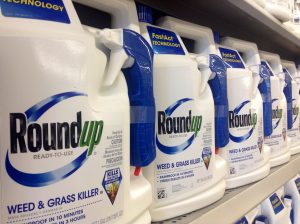26
Oct
Judge Reduces Award, But Upholds Verdict in Roundup Case Against Bayer’s Monsanto
 (Beyond Pesticides, October 26, 2018) California Superior Court Judge Suzanne Bolanos is upholding a jury’s verdict that exposure to the herbicide glyphosate caused school groundkeeper Dewayne Johnson to develop cancer. The ruling comes after concern that Judge Bolanos would intervene and overturn the entire monetary award to Mr. Johnson. However, in her final ruling, the Judge decided only to reduce the punitive damages to the same amount the jury awarded in compensatory damages, $39 million. This ruling reduced the total amount awarded to Mr. Johnson from $289 million to $78 million.
(Beyond Pesticides, October 26, 2018) California Superior Court Judge Suzanne Bolanos is upholding a jury’s verdict that exposure to the herbicide glyphosate caused school groundkeeper Dewayne Johnson to develop cancer. The ruling comes after concern that Judge Bolanos would intervene and overturn the entire monetary award to Mr. Johnson. However, in her final ruling, the Judge decided only to reduce the punitive damages to the same amount the jury awarded in compensatory damages, $39 million. This ruling reduced the total amount awarded to Mr. Johnson from $289 million to $78 million.
While attorneys for Mr. Johnson are disappointed in the reduction, they are pleased that the judge did not take further action. “Although we believe a reduction in punitive damages was unwarranted and we are weighing the options, we are pleased the court did not disturb the verdict,” Diana McKinley, Mr. Johnson’s spokeswoman, told the Associated Press (AP). Bayer, which finalized its merger with Monsanto earlier this year, is vowing to continue its nationwide defense against the over 8,000 cases the company inherited from its former rival currently working their way through the courts.
A tentative ruling from Judge Bolanos earlier this month indicated that she thought the jury had gone too far in awarding such a high amount in punitive damages, which were based on the jury’s viewpoint that Monsanto ignored research showing cancer risks from glyphosate products. This resulted in a rare public rebuttal from jurors, which urged Judge Bolanos to maintain their decision. In a letter to the judge obtained by the San Francisco Chronicle, juror Robert Howard indicated that the prospect that “our unanimous verdict could be summarily overturned demeans our system of justice and shakes my confidence in that system.”
However, when issuing her final ruling, Judge Bolanos indicated that jurors had the right to reject Monsanto’s witnesses in favor of those presented by plaintiffs. “Thus, the jury could conclude that Monsanto acted with malice by consciously disregarding a probable safety risk,” the judge wrote.
In late September, Bayer asked the court to either reverse the verdict, reduce, the award, or grant a new trial for the company. Based on the recent ruling, rather than ask for a new trial, the company plans to appeal the verdict. Legal experts don’t expect the company to settle any of the trials until there are a large number of unfavorable verdicts across the country, according to AP.
Mr. Johnson worked for the Benicia Unified School District where he applied Roundup and Ranger Pro 20 to 30 times a year. He developed non-Hodgkin’s lymphoma at the age of 42 in 2014.
Roundup and Ranger Pro contain the active ingredient glyphosate, which was determined by the World Health Organization in 2015 to be a ‘probable human carcinogen’ with sufficient evidence of carcinogenicity based on laboratory studies. Glyphosate has been linked to a host of problems in addition to cancer, including endocrine disruption, reproductive impacts, and kidney and liver damage. Even more concerning is the fact that regulators throughout the world equate glyphosate and its formulated products like Roundup as one in the same. Regulators, including the European Food Safety Authority and the U.S. Environmental Protection Agency, made determinations counter to the WHO cancer classification based on a review of glyphosate alone. However, WHO and independent scientific research have shown that formulated glyphosate products like Roundup and Ranger Pro contain highly toxic ‘inert’ ingredients like polyethoxylated tallowamine (POEA), which has been shown to kill human cells.
Because regulatory agencies only test active ingredients, and don’t test formulated products and combinations of active and inert ingredients, WHO’s determination is based on a much more robust body of scientific literature than any determination made by a government agency.
For more information about the health effects of glyphosate and its formulated products, see Beyond Pesticides’ glyphosate fact sheet. And for a comprehensive, centralized source of information about Bayer’s Monsanto trial, see our initial coverage of the ruling, which includes transcripts, expert presentations, exhibits, court documents, and further resources.
All unattributed positions and opinions in this piece are those of Beyond Pesticides.
Source: Associated Press










